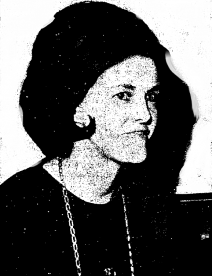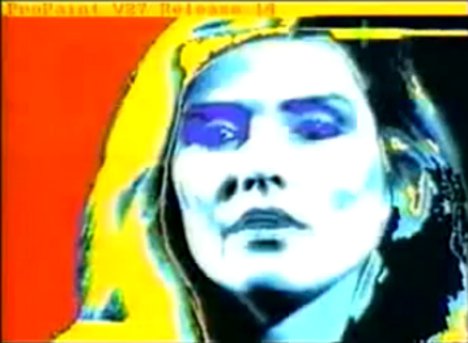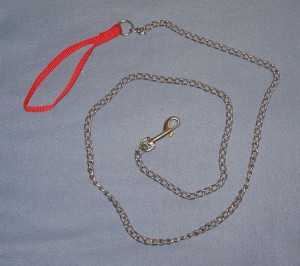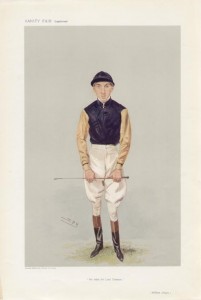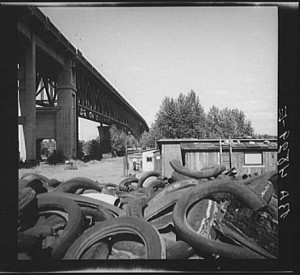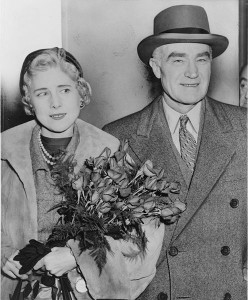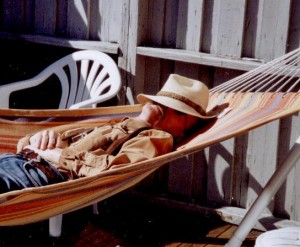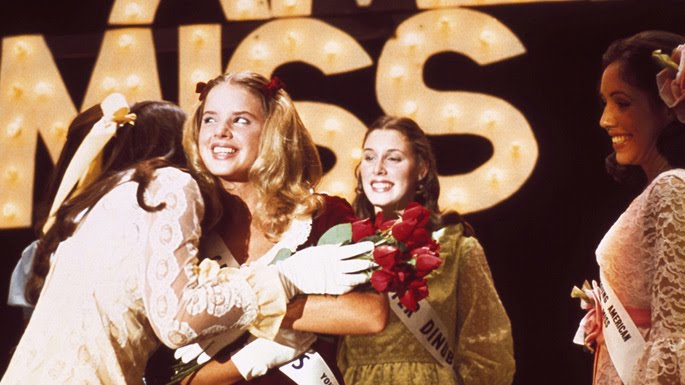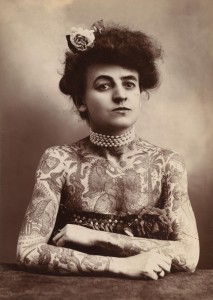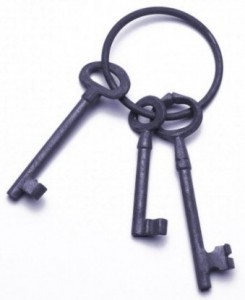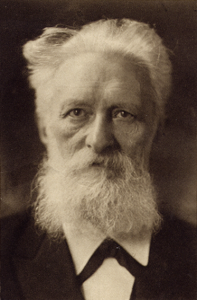As paperbacks become increasingly paperless, libraries have begun loaning e-books. From Singularity Hub: “Amazon recently announced that their new Kindle Lending Library feature will be arriving ‘later this year.’ The Kindle Lending Library will allow over 11,000 public libraries in the US to lend copies of digital books to Kindle users for short periods of time (probably 7-14 days).”
You are currently browsing the yearly archive for 2011.
From Joan Didion’s 1966 article, “Some Dreamers of the Golden Dream” (originally entitled, “How Can I Tell Them There’s Nothing Left?”), which profiled Lucille Marie Maxwell Miller, a mother of three who murdered her husband in lovely San Bernardino one sun-drenched day:
Of course she came from somewhere else, came off the prairie, in search of something she had seen in a movie or heard on the radio. For this is a Southern California story. She was born on January 17, 1930, in Winnipeg, Manitoba, the only child of Gordon and Lily Maxwell, both school teachers hers and both dedicated to the Seventh-Day Adventist Church whose members observe the Sabbath on Saturday, believe in an apocalyptic Second Coming, have a strong missionary tendency, and, if they are strict, do not smoke, drink, eat meat, use makeup, or wear jewelry, including wedding rings. By the time Lucille Maxwell enrolled at Walla Walla College in College Place, Washington, the Adventist school where her parents then taught, she was an eighteen-year-old possessed of unremarkable good looks and remarkable high spirits. “Lucille wanted to see the world,’ her father would say in retrospect, ‘and I guess she found out.”
The high spirits did not seem to lend themselves to an extended course of study at Walla Walla College and in the spring of 1949 Licille-Maxwell met and married Gorgon (“Cork”) Miller, a twenty-four-year-old graduate of Walla Walla and of the University of Oregon dental school, then stationed at Fort Lewis as a medical officer. “Maybe you could say it was love at first sight,” Mr. Maxwell recalls. “Before they were ever formally introduced, he sent Lucille a dozen and a half roses with a card that said even if she didn’t come outon a date with him, he hoped she’d find the roses pretty anyway.” The Maxwells remember their daughter as a “radiant” bride.
Unhappy marriages so resemble one another that we do not need to know too much about the course of this one. There may or may not have been trouble on Guam, where Cork and Lucille Miller lived while he finished his Army duty. There may or may not have been problems in the small Oregon town where he first set up private practice. There appears to have been some disappointment-about their move to California: Cork Miller bad told friends that he wanted to become a doctor, that he was unhappy as a dentist and planned to enter the Seventh-Day Adventist College of Medical Evangelists at Loma Linda, a few miles south of San Bernardino. Instead he bought a dental practice in the west end of San Bernardino County, and the family settled there, In a modest house on the kind of street where there are always tricycles and revolving credit and dreams about bigger houses, better streets. That was 1957. By the summer of 1964 they had achieved–the bigger house on the better street and the familiar accouterments of a family on its way up: the $30,000 a year, the three children for the Christmas card, the picture window, the family room, the newspaper photographs that showed “Mrs. Gordon Miller, Ontario Heart Fund Chairman.” They were paying the familiar price for it. And they had reached the familiar season of divorce.•
Joan Didion interviewed in Los Angeles in the 1970s by NBC News.
Tags: Gorgon "Cork" Miller, Joan Didion, Lucille Marie Maxwell Miller
Tags: Andy Warhol, Debbie Harry
My niece is very sick over losing her poodle help her read (queens/manhattan)
She was lost Sept 1 2010, between 86th & 87thst.. older white poodle..my niece grades went down, her weight,& she is very depressed .. will not speak anymore..we are very worried about her, , and we are all sick and worried about her and my sister..we know she is in someone’s house…Please if anyone knows of a neighbor, family, or friends that might have her ..please contact me or my sister..My sister has not giving up due to my nieces condition….I’m sure you saw my sister’s posting..The dog’s name is Cindy..everyday that goes by, her daughter is getting worse…I hope there are people out there that know how a child feels if they lost thier pet…Cindy is 10 years old and needs medication…please again white poodle ..I will post a pic of her too..She might have long hair by now…she was lost..by woodhaven Blvd near Jamica ave…Bring my niece back to health again..we tried everything for her..speech therapy, doctor’s, and even willing to get her a new poodle but she only noddes her head no no…but will not speak only says Cindy. and just cries… My sister also is down to nothing and very depressed too.. the whole family are worried about them…please helppppppppppppppppppppppppppppppppppppppppppppppppp. As I’m writing this, I am sobbing and crying too…Someone out there will help us get Cindy back…God Bless you!!!!!
Robert Ashley’s avant television opera Perfect Lives (Privacy Rules), composed between 1978-1980 with the help of “Blue” Gene Tyranny, was a surreal, discordant mind-blower when it was first performed, and it’s still really powerful. Video artist John Sanborn is responsible for the amazing visuals. In Robert Ashley, this work is profiled by director Peter Greenaway. Despite being a huge blowhard, Greenaway is capable of greatness, and it’s hard to imagine anyone could have better captured Ashley’s vision.
Tags: "Blue" Gene Tyranny, John Sanborn, Peter Greenaway, Robert Ashley
Even more than a century ago, you had to live a fast life to be thought of as an old-timer by the age of 34. That was sadly the case with a jockey who met his end on Valentine’s Day in 1901. An excerpt from a Brooklyn Daily Eagle story about him:
“Lawrence Urelli, 34 years old, no home, was found dead in a barn owned by Dr. Robert S. Waters, this morning at Avenue U and Van Sicklen Avenue. It appeared that the man had been drinking of late and the doctor had warned him yesterday to stop it. The doctor also told him to keep away from the barn. This morning when he found the lifeless body of Urelli part of the contents of a bottle of wood alcohol which was in the barn had been used, and it is thought Urelli drank it. The Coroner was notified.
Urelli was an old-time jockey, and the Jockey Club will assume all obligations for his funeral.”
•••••••••••
An excerpt from the 2009 GQ article, “Tent City, U.S.A.” an eyewitness account of a latter-day Hooverville in Fresno, California, by George Saunders, the fiercely humanistic short story writer who uses humor the way Twain and Vonnegut did:
“OH, LOTS OF PEOPLE die in here.
The Ho man died. Gladys died. Ferdinand over here died. A guy by the name of Tupac got ran over by a train right here. Richard died, the guy they called the Birdman. He got hit by a train, just back in January, January 31. Because the Mission denied him to stay overnight, he got a blanket from a friend and stayed behind one of the train cars, and lo and behold, they were switching at night, and he was asleep, and evidently they just popped him like a strawberry basically. Really a super guy. But mentally challenged. He would shoot birds, thinking they were there. Very strange fellow. Not with an actual gun, no. Just with his fingers.
There was Edson. He was alcoholic, a good man, but mind you, his son was a professional baseball player. He could have lived differently, but he chose to be out here drinking. There was a lady got hit on the freeway couple months ago. She was crossing the 99, wasn’t paying attention. We’ve had overdoses, stabbings. One homeless guy got burned in his blankets. Some juveniles poured gas on him. We had two people shot here in the past three months. One of them, I was sitting right here when I heard five sharp pops from under the bridge. Then here came this little gal, racing by, shrieking, I told you I’d do it! I told you I’d do it! And she disappeared from Tent City and was never seen again, and the guy she shot in the face died.” (Thanks Longform.)
••••••••••
Tags: George Saunders, Kurt Vonnegut, Mark Twain
Whether he’s a prophet or crackpot (or both), Queens-born futurist Ray Kurzweil is having a moment. Sheerly Avni posted a video at Open Culture of Kurzweil taking questions from Time magazine editor Stephen Koepp.
Tags: Ray Kurzweil, Sheerly Avni, Stephen Koepp
An outline of the idea behind Time magazine, which struggles for relevance in the endless news cycle of the Internet age, from “Untimely,” Jill Lepore’s smart 2010 New Yorker article about the feud between glossy Goliaths Henry Luce and Harold Ross:
“Time is an artifact of the Age of Efficiency. Americans, Luce and Hadden believed, were too busy to read the newspaper. The New York Times was ‘unreadable,’ too dense, too dull. Time would be everything, abridged: a week’s worth of news in twenty-odd pages that could be read in an hour. An early bid for subscribers read ‘Take TIME: It’s Brief.’ Each issue was to contain about a hundred articles, none more than four hundred words long. Luce and Hadden put together dummy issues by cutting sentences out of seven days’ worth of newspapers and pasting them onto pages. At first, Time was a kind of assembly-line news, manufactured in a Taylorized shop. But they wanted it to be more than a “digest” (the word has something alimentary in common with what’s now called a “feed”). They sorted the news into categories—National Affairs, Foreign Affairs, The Arts, Sport—which, amazingly, hadn’t been done before, or not nearly as crisply. ‘The one great thing was simplification,” Luce said. “Simplification by organization, simplification by condensation, and also simplification by just being damn well simple.’ The Simplified Spelling Board, endorsed by Theodore Roosevelt, had excised the extra ‘e’ from ‘abridgement.’ Turning the Times into Time saved a letter right there. No wasted letters, no wasted thought. As Luce and Hadden explained in the magazine’s prospectus, ‘TIME is interested—not in how much it includes between its covers—but in HOW MUCH IT GETS OFF ITS PAGES INTO THE MINDS OF ITS READERS.’” (Thanks Longform.)
Tags: Harold Ross, Henry Luce, Jill Lepore
The Objectivist at Madison Square Garden with Phil Donahue in 1979.
Tags: Ayn Rand, Phil Donahue
Wanted Please Read (USA )
WANTED .. I am looking for somebody to donate 1 million dollars to me I am really tired of working and I would just like to enjoy my life for a little while I am a full time college student, I do not do drugs, and do not like drinking I can assure you that money would be spent wisely, I will not spend it foolishly. If you have what I am looking for please email me .. The sooner the better I hope to hear from somebody soon … Thank you
If you don’t like to donate think of it as an investment, a lot of people will hear about your generosity and it could make you famous, or bring more business to your company…
Singer-songwriter Phoebe Snow just passed away at age 60. Here she is performing with Linda Ronstadt on Saturday Night Live in 1979.
From “Poetry Man“:
“So once again
It’s time to say so long
And so recall the cull of life
You’re going home now”
Tags: Linda Ronstadt, Phoebe Snow
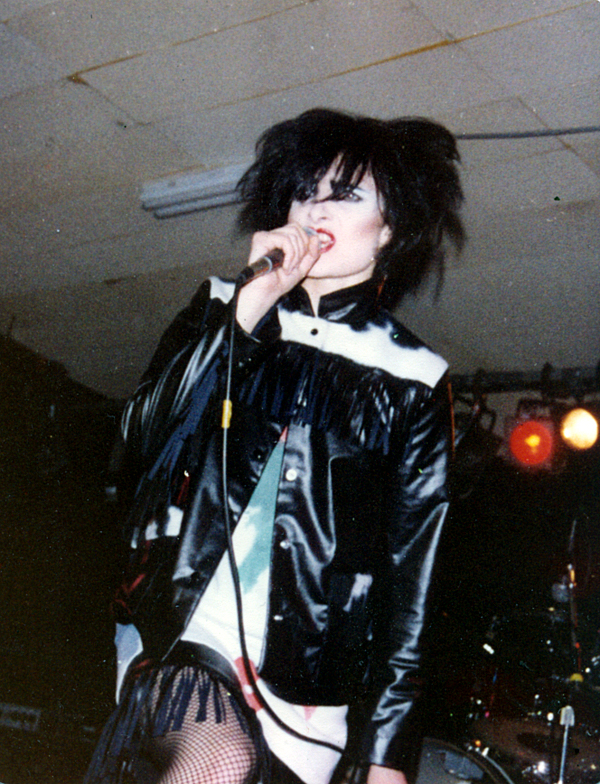
"There was a time in Long Island's cultural history when the whole world looked here for the next big trend in rock 'n' roll." (Image by Malco23.)
In this classic photograph, the Siouxsie and the Banshees frontwoman performs at the legendary Long Island rock club, My Father’s Place. The Roslyn-based live-music venue was once a leading stage for unknown rock artists, from Bruce Springsteen to Meat Loaf to Hall & Oates. It closed its doors in 1987. From a 2000 New York Times piece recalling the cabaret:
“THERE was a time in Long Island’s cultural history when the whole world looked here for the next big trend in rock ‘n’ roll. That was between 1974 and 1980, the heyday of My Father’s Place, a cabaret in Roslyn.
And Michael Epstein, known as Eppy, ran the whole shebang.
Along with My Father’s Place, which opened on Memorial Day in 1971 with a concert by Richie Havens, a confluence of entities created a scene that would influence music for decades to come.
Dance-oriented rock ‘n’ roll, punk, singer-songwriters and New Wave music had become the rage — and it was essential for musicians to come here to perform. My Father’s Place, WLIR-FM and the dance club Malibu in Long Beach were at the center of popular music.
Today, 13 years after My Father’s Place closed, Mr. Epstein still longs for the club. ‘Once it’s in your blood, you never lose that feeling,’ he said.”
•••••••••
Talking Heads at My Father’s Place on May 10, 1978:
Tags: Bruce Springsteen, David Byrne, Eppy, Hall & Oates, Meat Loaf, Michael Epstein, Richie Havens, Siouxsie and the Banshees, Talking Heads

"They pulled out a pistol and a knife and stripped gamblers of more than $5,600." (Image by Immanuel Giel.)
An excerpt from Kirk Semple and Jeffrey E. Singer’s New York Times article about the city’s illegal Chinese gambling parlors, several of which have recently been hit by armed robbers:
“One popular mah-jongg parlor in Flushing thrived, until recently, in a two-bedroom apartment where as many as 20 people played at a time. Some regulars would stay for as long as two days, taking catnaps on a sofa. They would eat takeout food, and in the evening the boss would oversee the preparation of more elaborate meals.
At parlors devoted to mah-jongg, the stakes do not get very high, with maximum wins and losses usually amounting to no more than several hundred dollars per person in a session. In other parlors, however, players may experience swings involving tens of thousands of dollars.”
Tags: Jeffrey E. Singer, Kirk Semple
Bachelor number two, from Waco, Texas. He was just 23.
Tags: Steve Martin
From the “1985” section of New York magazine’s fun oral history marking the 25th anniversary of the Beastie Boys’ Licensed to Ill:
“Diamond: Yauch and I got an apartment in Chinatown—apartment might be an overstatement. It was on Chrystie Street when it was still really Chinatown, and it was an entirely sweatshop building. We could play music literally any time of the day or night.
Diamond: I did go [to Vassar] for a semester, and it was hard. I had to go [to my mom] and say, ‘It’s a total waste of your money and my time, because all I want to do is be in this band.’ Rick and Russell were like, ‘You’re gonna make a video for She’s On It.’ And in our minds, we were the biggest deal in the entire world. Our friends might not have agreed. But you know what I mean—all of a sudden we were making a video, and it started to get shown. We were big on the local video channel U68.
Ross: They went up to perform at the Apollo, and Beastie Boys shows at this point were a little haphazard at best. But by the second song, Mike D’s doing the Jerry Lewis, and the whole Apollo Theater is going, ‘Go, white boys! Go, white boys!’ In my head I’m like, ‘My friends are gonna be famous!’
Horovitz: And then the Madonna tour happened. We did like three songs, and then I did the electric boogaloo for a minute, and then we fucked with the audience. They hated us. Kids literally in tears, parents wanting to kill us. It was awesome. They wanted to kick us off the tour, and Madonna was like, ‘These guys are staying, these guys are great.’ We got back to New York, and we were really feeling ourselves. We were crushing our old spots.”
••••••••••
Tags: Beastie Boys, Rick Ross
A 1986 commercial for the grand opening of a new location for the Tower Records chain, which is now out of business. Also gone or going: record stores, VHS tapes, audio cassettes, video stores. Some knew they’d be short-lived.

"The Atomic Gardening Society had the lofty goal of furthering scientific research. It was really an early crowd-sourcing, citizen-scientist movement." (Image by Nicosmos.)
American gardening took a turn for the unusual after WWII when some gardeners purposely irradiated plants to produce mutations which they hoped would be beneficial. In the wake of Japan’s nuclear disaster, Pruned interviews scientist and gardening historian Paige Johnson, who guesses at the results of these experiments, which were not well-documented, but may still be having an impact on our food chain. An excerpt from the Q&A:
“Pruned: What were some of the mutations these gardens produced?
Johnson: While the scientific experiments are documented pretty well in the journal literature we actually don’t know what mutations came from the home experiments. The Atomic Gardening Society had the lofty goal of furthering scientific research. It was really an early crowd-sourcing, citizen-scientist movement. Very ahead of its time!
But obviously there are issues around properly controlling experiments in people’s backyards, and there was no avenue to ‘publish’ results. A really interesting part of this investigation is what unknown progeny might be out there.
Pruned: So really there might be an atomic heirloom tomato that’s now growing on somebody’s allotment garden. They’re thinking that it’s strangely misshapen and uniquely pigmented because it’s an heirloom, but in fact it’s a gamma-mutated variety. It’s a kind of amnesia, one that’s actually fairly common when it comes to the foods that we eat. Pick any vegetable or meat at Wal-Mart or the local farmer’s market, and more likely than not, there’s a long history there of genetic manipulation that’s largely forgotten.
Johnson: The atomic plant varieties certainly fit it with your ‘food amnesia’ premise; it would be rare for the consumer to know anything about the genetic history of the food we consume, much less if it came out of the mid-century atomic experiments. But the path from an irradiated seed, or a gamma garden, to the table can be anything but straight.”
I need general help, you need stuff or cash (Bronx)
I posted this long ago and unfortunately lost access to many of the responses. A few of them were promising and I was disheartened so I gave up for the moment. I’m in the midst of a divorce and have three little boys. I work from home doing tattoos. I am fully licensed in NYS since 2003. I use all disposable equipment and the best materials you can buy. If not for the age of my youngest (2), I would be working in a shop.
I need help organizing my apartment and caring for my boys. Eventually, this would turn into a sitting arrangement where I may actually leave the house on occasion! In the beginning, it would be more like dealing with the kids while I work or helping me around the house. Once I see that everyone is comfortable and that you can handle my little men, I would be more inclined to leave the apartment to handle my errands without all three in tow.
I’m not made of money, but the more money I am able to make, the more I am able to pay. I also have an inordinate amount of things to list on eBay and it is hard to do while chasing after a 7, 5 and 2 year old. Now, maybe some of the items would be of interest to you and you’d take some as pay. Or maybe I can just pay you from my proceeds. Ideally, I’d like to rid my life of excess, reclaim closet space and live a cleaner and easier life. I’d also like to devote more time to my art, be it my tattooing or the other forms that I like to dabble in.
I can also pay you in tattoos, if you’d like. I realize this ad is a bit all over the place but feel free to reply, tell me more about you and why you think you’d make a good fit as my general helper / baby sitter. I also cook, and would not only be able to teach you, if you wanted, but would also be able to cook for you if that was something you’d like as a barter. I’m just trying to make the most of my skills and my time until I can re-enter the working world in a more day to day fashion.
I would prefer that those responding like children. My boys are extremely intuitive and won’t open up to someone who is fake. I don’t care if you’re male or female but reserve the right to do a background check as you would be in my home and around my babies. I don’t care if you’re gay or straight, black, white or purple. My only real requirement is that you enjoy children, be motivated and ready to tackle whatever strange job I may have set out for the day… and be young enough to handle their demands.
I have a lot of gothic style clothing to list on eBay in various sizes… so this could appeal to those that appreciate that style… brands like Lip Service, Tripp, Morbid Threads, etc. I also have many electronic items to part ways with. I don’t even want to think about the masses of baby boy items and clothing that I have to part with. This could also be good for a mommy-to-be or someone who knows someone who could use that. I’m open to barter…
So, shoot me an email with your information and I will reply to those that I think may be a good fit. Who knows… maybe I could use more than one person for this endeavor. And if you’re not available to help, but are instead interested in a tattoo, feel free to email me too.
Thanks a bunch.
Such steady “hands.”
Locksmiths did not have an easy time of it in the 19th century, as the following trio of stories from the Brooklyn Daily Eagle demonstrates.
••••••••••
“Objects To Being Shot At” (September 19, 1892): “Frederick Harbold, a locksmith of 741 Flushing avenue, was in the Lee avenue police court to-day to complain of Alexander Betts, 17 years old, of Flushing avenue, whom he says is the bad boy of the neighborhood. ‘This boy,’ said he, ‘takes pleasure in annoying storekeepers. So long as he confined this annoyance to rapping on my windows I did not mind, but on Saturday he got an air gun and shot a bullet through my store window. I heard the bullet whiz past my ear. I thought this was going too far and I want him arrested.’ Harbold was told to apply for a warrant at the Gates avenue police court.”
••••••••••
“Fun With A Locksmith” (June 24, 1895): “Patrick McCann, a laborer, 27 years old, had a lot of fun with Joseph Cohn, a poor Hebrew locksmith of 215 Third street, who went to the house at 141 North Ninth street, in which McCann lives last Wednesday. McCann, who is a giant in strength, told the traveling locksmith he wanted a key fitted to his kitchen door and when he got Cohn in the kitchen he locked the door. Then he threw the man down, it is alleged, kicked him and pulled his whiskers and when he tired of this sort of fun he placed the end of a revolver at the unfortunate fellow’s head and demanded 10 cents for beer. As Cohn did not have any money McCann locked him in the room and kept him prisoner for two hours. McCann will pay for his fun, however, as Justice Goetting sent him to jail for five days this morning.”
••••••••••
“Sudden And Very Remarkable Death” (September 4, 1860): “Joseph Yarkhim, a Bohemian and a locksmith, 60 years of age, and unmarried, was, on Sunday evening, found dead in his room. A neighbor entered and saw the old man apparently alive, sitting nearly upright on a chest, slightly bent forward, but in quite a natural position, and having in one hand a piece of twine. The neighbor walked up and extended a hand to Mr. Yarkhim, but was instantly shocked at the discovery that the open eyes that were fixed upon him were fixed in death. The old man had died with singular suddenness, and apparently without a struggle, as no distortion appeared in his features which wore their usual mild though sudden expression. The Coroner was summoned, and found the deceased retaining the same singularly life-like posture and aspect–the eyes apparently staring at the visitors as if in inquiry at the object of their call. The inquest resulted in a verdict of ‘death from debility and privation.’ Deceased was a friendless and penniless old man, whose life has been a series of hardships and vicissitudes that at last exhausted the last remnant of his vital energy. He often omitted eating, and had no near friend to advise or attend to him.”
Tags: Alexander Betts, Frederick Harbold, Joseph Cohn, Joseph Yarkhim, Justice Goetting, Patrick McCann
The first tablet computer was designed all the way back in 1968, but this 1994 Knight Ridder video envisioning tablets is still amazing. (Thanks Gawker.)

Any revolution that lasts longer than five minutes will be televised (with limited commercial interruption) on every screen the size of a pocket or a pin. But I would guess media is as bad as ever at anticipating protest signs going up and walls coming down. (Image by Adam Turner.)
“The Revolution Will Not Be Televised” by Gil Scott-Heron
You will not be able to stay home, brother. You will not be able to plug in, turn on and cop out. You will not be able to lose yourself on skag and skip out for beer during commercials, because the revolution will not be televised.
The revolution will not be televised. The revolution will not be brought to you by Xerox in 4 parts without commercial interruptions. The revolution will not show you pictures of Nixon blowing a bugle and leading a charge by John Mitchell, General Abrams and Spiro Agnew to eat hog maws confiscated from a Harlem sanctuary. The revolution will not be televised.
The revolution will not be brought to you by the Schaefer Award Theatre and will not star Natalie Woods and Steve McQueen or Bullwinkle and Julia. The revolution will not give your mouth sex appeal. The revolution will not get rid of the nubs. The revolution will not make you look five pounds thinner, because the revolution will not be televised, brother.
There will be no pictures of you and Willie Mae pushing that shopping cart down the block on the dead run, or trying to slide that color television into a stolen ambulance. NBC will not be able predict the winner at 8:32 on reports from 29 districts. The revolution will not be televised.
There will be no pictures of pigs shooting downbrothers on the instant replay. There will be no pictures of pigs shooting down brothers on the instant replay.
There will be no pictures of Whitney Young beingrun out of Harlem on a rail with a brand new process. There will be no slow motion or still life of Roy Wilkens strolling through Watts in a Red, Black and Green liberation jumpsuit that he had been saving for just the proper occasion.
Green Acres, The Beverly Hillbillies, and Hooterville Junction will no longer be so damned relevant, and women will not care if Dick finally gets down with Jane on Search for Tomorrow because Black people will be in the street looking for a brighter day. The revolution will not be televised.
There will be no highlights on the eleven o’clock news and no pictures of hairy armed women liberationists and Jackie Onassis blowing her nose. The theme song will not be written by Jim Webb, Francis Scott Key, nor sung by Glen Campbell, Tom Jones, Johnny Cash, Englebert Humperdink, or the Rare Earth. The revolution will not be televised.
The revolution will not be right back after a message about a white tornado, white lightning, or white people. You will not have to worry about a dove in your bedroom, a tiger in your tank, or the giant in your toilet bowl. The revolution will not go better with Coke. The revolution will not fight the germs that may cause bad breath. The revolution will put you in the driver’s seat.
The revolution will not be televised, will not be televised, will not be televised, will not be televised. The revolution will be no re-run, brothers. The revolution will be live.
Tags: Gil Scott-Heron

